26 Jan 2015
Arts Award Nominees 2015
Recognises artists whose work asserts artistic freedom and battles repression and injustice.
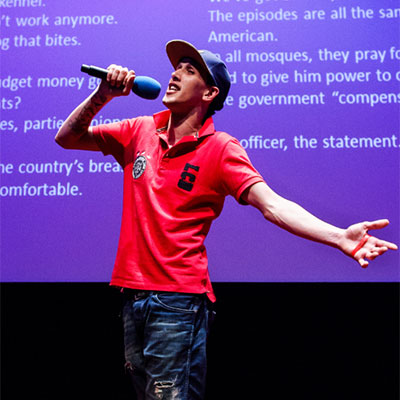 |
Winner
Mouad “El Haqed” Belghouat
Rapper
Morocco
“I am talking in the name of the people / Those who spoke up, and those who were stepped on / I am talking to you with no fear, and I will take the consequences.” Moroccan rapper and human rights activist El Haqed (roughly translated as ‘the enraged’) has not only seen his songs censored and his album banned but also been imprisoned three times since 2011 – including a one-year jail term for lyrics critical of the police in his song Dogs of the State. Imprisoned for four months in 2014, after seeing witnesses at his trial stopped from testifying and key pieces of evidence barred, El Haqed continues to make music about endemic corruption in the Moroccan state and widespread poverty in his country.
Acceptance speech: El Haqed: I will fight for freedom, equality and human rights for ever
Full profile: Arts nominee Mouad ‘El Haqed’ Belghouat
|
Xavier “Bonil” Bonilla
Cartoonist
Ecuador
Ecuadorian cartoonist Xavier Bonilla, aka Bonil, has repeatedly faced legal action, fines and smear campaigns from his country’s government. In 2013 President Rafael Correa introduced the Communications Act in Ecuador, ostensibly allowing government the right to decide what journalistic work was or wasn’t appropriate. The first to be targeted by this legislation, Bonil and El Universo newspaper were sued for publishing a cartoon about a heavy-handed raid on a journalist’s house. When the court fined the paper nearly £61,000 and ordered Bonil to draw a “retraction cartoon”, Bonil responded in his famously sarcastic style. With Bonil now involved in a second case against him, his refusal to back down in this cat-and-mouse with Correa has earned him a reputation as one of South America’s most fearless cartoonists. Full profile: Arts nominee Xavier “Bonil” Bonilla
|
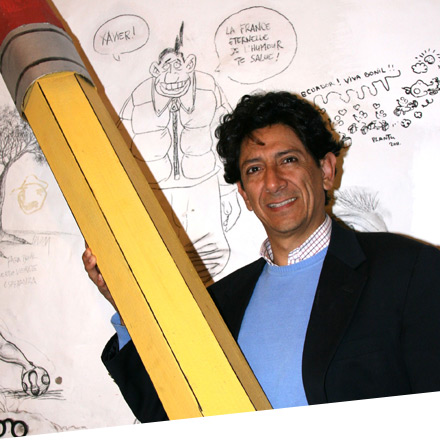 |
 |
Rory “Panti Bliss” O’Neill
Performance artist
Ireland
Dublin-based drag queen and stand-up comedian Panti caused waves in the Irish media, and later Irish and European parliaments, for naming, on-air, two columnists and a Catholic lobbying group as examples of homophobia within Ireland’s media. The TV station hosting Panti backed down to legal threats, but O’Neill didn’t, taking to the stage of Dublin’s Abbey Theatre as Panti to eloquently defend his statements. The speech has had hundreds of thousands of YouTube views, and O’Neill’s subsequent show High Heels in Low Places both tells the story and details the difficulties gay people face in Ireland, a country in which homosexuality was a criminal act until 1988. Full profile: Arts nominee Rory “Panti Bliss” O’Neill
|
Songhoy Blues
Musicians
Mali
Fleeing North Mali after Islamist groups captured the area and imposed strict sharia law banning all secular music, four musicians who met as refugees came together to form the band Songhoy Blues. Calling for an end to the conflict, their music plays to an audience made up of both Songhoys and Tuaregs – two previously feuding North Malian groups now expelled from their homes by insurgent Islamist groups. After signing with Africa Express and collaborating with artists including Damon Albarn and the Yeah Yeah Yeahs in 2013, they began a worldwide tour last year. Their debut album, Music In Exile, will be released in February 2015. Full profile: Arts nominee Songhoy Blues
|

|
14 Jan 2015 | Europe and Central Asia, France, News and features, Turkey
In October, Turkish cartoonist Musa Kart was the subject of a global solidarity campaign from his fellow artists. Kart was facing nine years in jail for insulting President Recep Tayyip Erodgan through a caricature for Cumhuriyet, where he commented on Erdogan’s alleged hand in covering up a high-profile corruption scandal. In response, his colleagues from around the world rallied in support of Kart, publishing their own #ErdoganCaricature on Twitter, and he was acquitted of the charges. This time, Kart is joining cartoonists in standing with Charlie Hebdo.
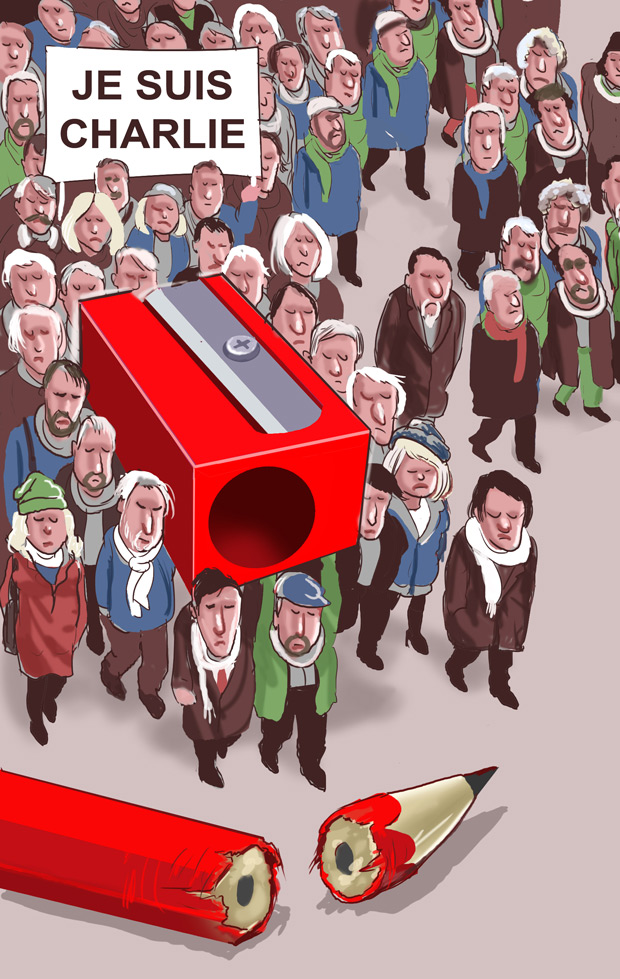
Cartoon courtesy Musa Kart
Kart told Index he feels “so sorry” and he has “lost his brothers” in last Wednesday’s brutal attack on the French satirical magazine’s offices, where 12 people — including cartoonists Stéphane Charbonnier aka Charb, Jean Cabut aka Cabu, Georges Wolinski and Bernard Verlhac aka Tignous — were killed.
Kart also ran into trouble with Turkish authorities back in 2005, when he was fined 5,000 Turkish lira for drawing then-Prime Minister Erdogan as a cat entangled in yarn. Kart puts the spotlight on Erdogan’s chequered history with cartoonists rights in a second piece, where the president declares that: “I condemn the attack. Ten years prison would have been enough for the cartoonists.”
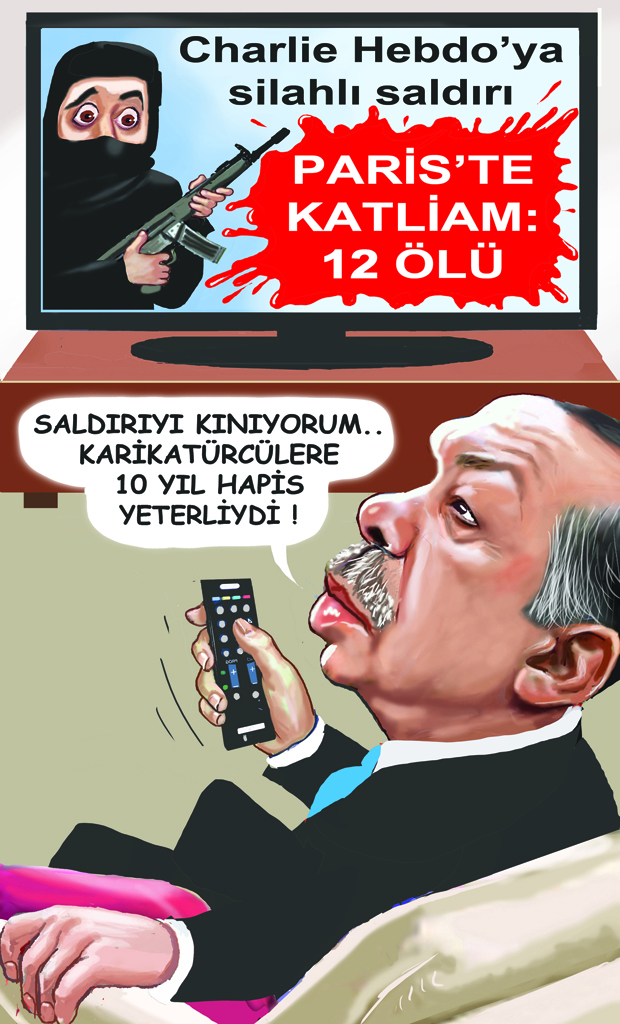
TV: “Massacre in Paris. Twelve dead.” President Erdogan: “I condemn the attack. 10 years prison would have been enough for the cartoonists.”
Erdogan condemned the “heinous terrorist attack” and Turkey’s Prime Minister Ahmet Davutoglu joined last Sunday’s march for unity in Paris. Much has been made of the apparent hypocrisy of world leaders who have suppressed free speech at home, taking part in what many considered a defiant show of support for that very right.
As Index CEO Jodie Ginsberg pointed out, Turkey imprisons more journalists than any other country in the world. Index’s media freedom map has received 72 reports of press freedom violations from Turkey since May 2014 alone. In the wake of the attacks in Paris, other Turkish cartoonists have been threatened by pro-government social media users. Police also raided the printing press of Cumhuriyet, as it prepared to publish selections from today’s issue of Charlie Hebdo.
Ecuadorian cartoonist Xavier Bonilla — known as Bonil — has also been targeted for his work. In 2013, the country got a new communications law which allows the government to fine and prosecute the media. After drawing a cartoon for El Universo, based on a raid on the home of a journalist and opposition advisor, Bonil became a victim of the new legislation. President Rafael Correa — who has been known to personally file lawsuits against critical journalists — ordered that a case be opened against the cartoonist. It found that his piece had invited social unrest and should be “rectified”, while El Universo was fined $92,000.
“I believe that humour is the best antidote to fear and the best defence against abuses of power. I have been drawing for 30 years, and I am not going to back down,” he wrote in an article in the current issue of Index on Censorship magazine.
Below are his cartoons in support of Charlie Hebdo.
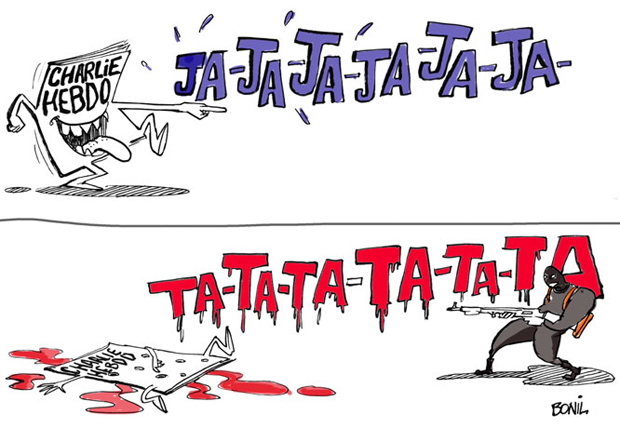
Cartoon courtesy of Bonil
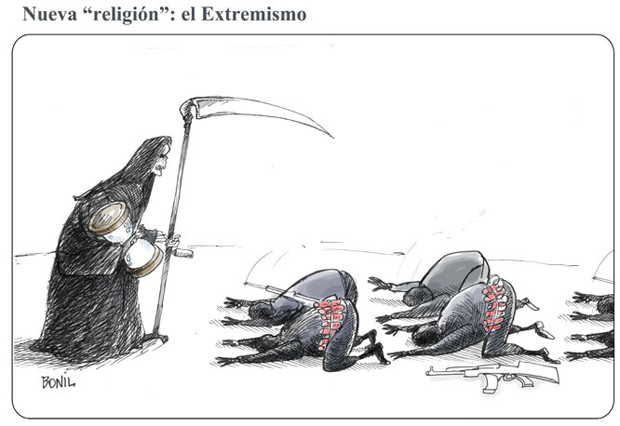
“New ‘religion’: extremism”
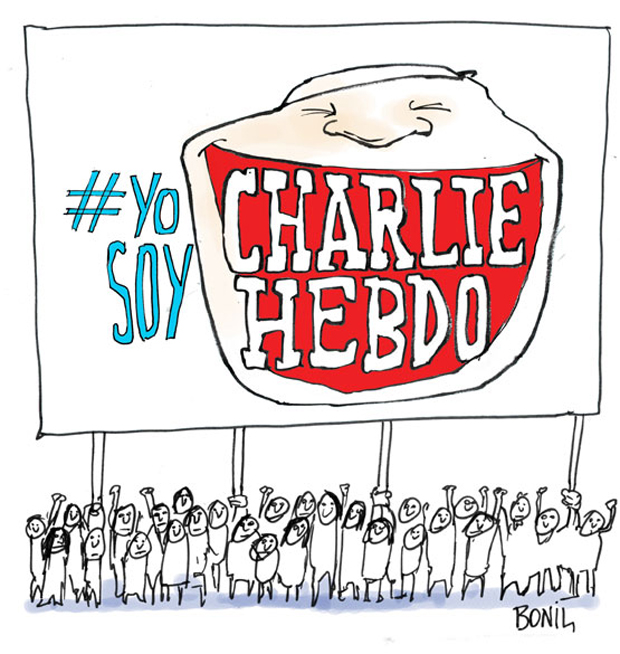
#IAmCharlieHebdo
This article was posted on 14 January 2015 at indexoncensorship.org
17 Dec 2014 | Magazine, Volume 43.04 Winter 2014
[vc_row][vc_column][vc_custom_heading text=”Packed inside this issue, are; an interview with fantasy writer Neil Gaiman; new cartoons from South America drawn especially for this magazine by Bonil and Rayma; new poetry from Australia; and the first ever English translation of Hanoch Levin’s Diary of a Censor; plus articles from Turkey, South Africa, South Korea, Russia and Ukraine.”][vc_row_inner][vc_column_inner width=”1/2″][vc_column_text]
Also in this issue, authors from around the world including The Observer’s Robert McCrum, Turkish novelist Elif Shafak, and Nobel nominee Rita El Khayat consider which clauses they would draft into a 21st century version of the Magna Carta. This collaboration kicks off a special report Drafting Freedom To Last: The Magna Carta’s Past and Present Influences.
[/vc_column_text][/vc_column_inner][vc_column_inner width=”1/2″][vc_single_image image=”62427″ img_size=”full”][/vc_column_inner][/vc_row_inner][vc_column_text]
Also inside: from Mexico a review of its constitution and its flawed justice system and Turkish novelist Kaya Genç looks at recent intimidation of women writers in Turkey.
[/vc_column_text][/vc_column][/vc_row][vc_row][vc_column][vc_custom_heading text=”SPECIAL REPORT: DRAFTING FREEDOM TO LAST” css=”.vc_custom_1483550985652{margin-right: 0px !important;margin-left: 0px !important;border-bottom-width: 1px !important;padding-top: 15px !important;padding-bottom: 15px !important;border-bottom-color: #455560 !important;border-bottom-style: solid !important;}”][vc_column_text]
The Magna Carta’s past and present influences
1215 and all that – John Crace writes a digested Magna Carta
Stripsearch cartoon – Martin Rowson imagines a shock twist for King John
Battle royal – Mark Fenn on Thailand’s harsh crackdown on critics of the monarchy
Land and freedom? – Ritu Menon writes about Indian women gaining power through property
Give me liberty – Peter Kellner on democracy’s debt to the Magna Carta
Constitutionally challenged – Duncan Tucker reports on Mexico’s struggle with state power
Courting disapproval – Shahira Amin on Egypt’s declining justice as the anniversary of the military takeover approaches
Digging into the power system – Sue Branford reports on the growth of indigenous movements in Ecuador and Bolivia
Critical role – Natasha Joseph on how South African justice deals with witchcraft claims
[/vc_column_text][/vc_column][/vc_row][vc_row][vc_column][vc_custom_heading text=”IN FOCUS” css=”.vc_custom_1481731813613{margin-right: 0px !important;margin-left: 0px !important;border-bottom-width: 1px !important;padding-top: 15px !important;padding-bottom: 15px !important;border-bottom-color: #455560 !important;border-bottom-style: solid !important;}”][vc_column_text]
Brave new war – Andrei Aliaksandrau reports on the information war between Russia and Ukraine
Propaganda war obscures Russian soldiers’ deaths – Helen Womack writes about reports of secret burials
Azeri attack – Rebecca Vincent reports on how writers and artists face prison in Azerbaijan
The political is personal – Arzu Geybullayeva, Azerbaijani journalist, speaks out on the pressures
Really good omens – Martin Rowson interviews fantasy writer Neil Gaiman, listen to our podcast
Police (in)action – Simon Callow argues that authorities should protect staging of controversial plays
Drawing fire – Rayma and Bonil, South American cartoonists’ battle with censorship
Thoughts policed – Max Wind-Cowie writes about a climate where politicians fear to speak their mind
Media under siege or a freer press? – Vicky Baker interviews Argentina’s media defender
Turkey’s “treacherous” women journalists – Kaya Genç writes about dangerous times for female reporters, watch a short video interview
Dark arts – Nargis Tashpulatova talks to three Uzbek artists who speak out on state constraints
Talk is cheap – Steven Borowiec on state control of South Korea’s instant messaging app
Fear of faith – Jemimah Steinfeld looks at a year of persecution for China’s Christians
Time travel to web of the past and future – Mike Godwin’s internet predictions revisited, two decades on
[/vc_column_text][/vc_column][/vc_row][vc_row][vc_column][vc_custom_heading text=”CULTURE” css=”.vc_custom_1481731777861{margin-right: 0px !important;margin-left: 0px !important;border-bottom-width: 1px !important;padding-top: 15px !important;padding-bottom: 15px !important;border-bottom-color: #455560 !important;border-bottom-style: solid !important;}”][vc_column_text]
Language lessons – Chen Xiwo writes about how Chinese authors worldwide must not ignore readers at home
Spirit unleashed – Diane Fahey, poetry inspired by an asylum seeker’s tragedy
Diary unlocked – Hanoch Levin’s short story is translated into English for the first time
Oz on trial – John Kinsella, poems on Australia’s “new era of censorship”
[/vc_column_text][/vc_column][/vc_row][vc_row][vc_column][vc_custom_heading text=”COLUMNS” css=”.vc_custom_1481732124093{margin-right: 0px !important;margin-left: 0px !important;border-bottom-width: 1px !important;padding-top: 15px !important;padding-bottom: 15px !important;border-bottom-color: #455560 !important;border-bottom-style: solid !important;}”][vc_column_text]
Global view – Jodie Ginsberg writes about the power of noise in the fight against censorship
Index around the world – Aimée Hamilton gives an update on Index on Censorship’s work
[/vc_column_text][/vc_column][/vc_row][vc_row][vc_column][vc_custom_heading text=”END NOTE” css=”.vc_custom_1481880278935{margin-right: 0px !important;margin-left: 0px !important;border-bottom-width: 1px !important;padding-top: 15px !important;padding-bottom: 15px !important;border-bottom-color: #455560 !important;border-bottom-style: solid !important;}”][vc_column_text]
Humour on record – Vicky Baker on why parody videos need to be protected
[/vc_column_text][/vc_column][/vc_row][vc_row][vc_column][vc_custom_heading text=”SUBSCRIBE” css=”.vc_custom_1481736449684{margin-right: 0px !important;margin-left: 0px !important;border-bottom-width: 1px !important;padding-bottom: 15px !important;border-bottom-color: #455560 !important;border-bottom-style: solid !important;}”][vc_column_text]Index on Censorship magazine was started in 1972 and remains the only global magazine dedicated to free expression. Past contributors include Samuel Beckett, Gabriel García Marquéz, Nadine Gordimer, Arthur Miller, Salman Rushdie, Margaret Atwood, and many more.[/vc_column_text][vc_row_inner][vc_column_inner width=”1/2″][vc_single_image image=”76572″ img_size=”full”][/vc_column_inner][vc_column_inner width=”1/2″][vc_column_text]In print or online. Order a print edition here or take out a digital subscription via Exact Editions.
Copies are also available at the BFI, the Serpentine Gallery, MagCulture, (London), News from Nowhere (Liverpool), Home (Manchester), Calton Books (Glasgow) and on Amazon. Each magazine sale helps Index on Censorship continue its fight for free expression worldwide.
 SUBSCRIBE NOW[/vc_column_text][/vc_column_inner][/vc_row_inner][/vc_column][/vc_row]
SUBSCRIBE NOW[/vc_column_text][/vc_column_inner][/vc_row_inner][/vc_column][/vc_row]
1 Oct 2014 | Magazine, Volume 43.03 Autumn 2014
[vc_row][vc_column][vc_custom_heading text=”The explosion of social media, the rise of citizen reporters, the dangers of freelancing in a war zone, the invention of new technology: journalism is clearly going through its biggest changes in history. But will the public know more or less as a result?”][vc_row_inner][vc_column_inner width=”1/2″][vc_column_text]
This is the question we explore in great depth in the latest issue of Index on Censorship magazine. Contributors include Iona Craig (2014 winner of the Martha Gellhorn Prize for her reporting in Yemen); Index award nominee Dina Meza and the BBC’s Samira Ahmed. We also have an exclusive, new short story by acclaimed novelist, playwright and author Ariel Dorfman.
[/vc_column_text][/vc_column_inner][vc_column_inner width=”1/2″][vc_single_image image=”59980″ img_size=”full”][/vc_column_inner][/vc_row_inner][vc_column_text]
And Australia’s race commissioner, Tim Soutphommasane, speaks out on how the right to be a bigot should not override the right to be free from the effects of bigotry.
[/vc_column_text][/vc_column][/vc_row][vc_row][vc_column][vc_custom_heading text=”SPECIAL REPORT: THE FUTURE OF JOURNALISM” css=”.vc_custom_1483551011369{margin-right: 0px !important;margin-left: 0px !important;border-bottom-width: 1px !important;padding-top: 15px !important;padding-bottom: 15px !important;border-bottom-color: #455560 !important;border-bottom-style: solid !important;}”][vc_column_text]
Back to the future: Iona Craig on journalists trying to stay safe in war zones
Digital detectives: Ray Joseph on the new technology helping Africa’s journalists investigate
Re-writing the future: Five young journalists talk on their hopes and fears for the profession – from Yemen, India, South Africa, Germany and the Czech Republic
Attack on ambition: Dina Meza on a Honduran generation ground down by fear
Stripsearch cartoon: Martin Rowson envisages an investigative reporter meeting Deep Throat
Generation why: Ian Hargreaves asks on how the powerful may or may not be held to account in the future
Making waves: Helen Womack reports from Russia on the radio station standing up for free media
Switched on and off: US journalist Debora Halpern Wenger on TV’s power shift from news producers to news consumers
TV news will reinvent itself (again): Taylor Walker interviews a veteran TV reporter on the changes ahead
Right to reply: Samira Ahmed on how the BBC tackles viewers’ criticism
Readers as editors: Stephen Pritchard on how news ombundsmen create transparency
Lobby matters: Political reporter Ian Dunt on the push/pull of journalists and politicians inside Britain’s corridors of power
Funding news freedom: Glenda Nevill looks at innovative ways to pay for reporting
Print running: Will Gore on how newspapers innovate for new audiences
Paper chase: Luis Carlos Díaz on overcoming Venezuela’s newsprint shortage
[/vc_column_text][/vc_column][/vc_row][vc_row][vc_column][vc_custom_heading text=”IN FOCUS” css=”.vc_custom_1481731813613{margin-right: 0px !important;margin-left: 0px !important;border-bottom-width: 1px !important;padding-top: 15px !important;padding-bottom: 15px !important;border-bottom-color: #455560 !important;border-bottom-style: solid !important;}”][vc_column_text]
Free thinking? Australia’s race commissioner Tim Soutphommasane on bigotry
Guarding the guards: Jemimiah Steinfeld on China’s human rights lawyers becoming targets
Taking down the critics: Irene Caselli investigates allegations that Ecuador’s government is silencing social media users
Maid equal in Brazil: Claire Rigby on the Twitter feed giving voice to abuse of domestic workers in Brazil
Home truths in the Gulf: Georgia Lewis on how UAE maids fear speaking out on maltreatment
Text messaging: Indian school books are getting “Hinduised”, reports Siddarth Narrain from India
We have to fight for what we want: our editor, Rachael Jolley, interviews the OSCE’s Dunja Mijatovic on 20 years championing free speech
Decoding defamation: Lesley Phippen’s need-to-know guide for journalists
A hard act to follow: Tamsin Allen gives a lawyer’s take on Britain’s libel reforms
Walls divide: Jemimah Steinfeld speaks to Chinese author Xiaolu Guo about a life of censorship
Taking a pop: Steven Borowiec profiles controversial South Korean artist Lee Ha
Mapping media threats: Melody Patry and Milana Knezevic look at rising attacks on journalists in the Balkans
Holed up in Harare: Index’s contributing editor Natasha Joseph reports from southern Africa on the dangers of reporting in Zimbabwe
Burma’s “new” media face threats and attack: Burma-born author Wendy Law-Yone looks at news in the run up to the impending elections
Head to head: Sascha Feuchert and Charlotte Knobloch debate whether Mein Kampf should be published
[/vc_column_text][/vc_column][/vc_row][vc_row][vc_column][vc_custom_heading text=”CULTURE” css=”.vc_custom_1481731777861{margin-right: 0px !important;margin-left: 0px !important;border-bottom-width: 1px !important;padding-top: 15px !important;padding-bottom: 15px !important;border-bottom-color: #455560 !important;border-bottom-style: solid !important;}”][vc_column_text]
Political framing: Kaya Genç interviews radical Turkish artist, Kutlug Ataman
Action drama: Julia Farrington on Belarus Free Theatre and the upcoming Belarus election
Casting away: Ariel Dorfman, a new short story by the acclaimed human rights writer
[/vc_column_text][/vc_column][/vc_row][vc_row][vc_column][vc_custom_heading text=”COLUMNS” css=”.vc_custom_1481732124093{margin-right: 0px !important;margin-left: 0px !important;border-bottom-width: 1px !important;padding-top: 15px !important;padding-bottom: 15px !important;border-bottom-color: #455560 !important;border-bottom-style: solid !important;}”][vc_column_text]
Index around the world: Alice Kirkland gives a news update on Index’s global projects
[/vc_column_text][/vc_column][/vc_row][vc_row][vc_column][vc_custom_heading text=”END NOTE” css=”.vc_custom_1481880278935{margin-right: 0px !important;margin-left: 0px !important;border-bottom-width: 1px !important;padding-top: 15px !important;padding-bottom: 15px !important;border-bottom-color: #455560 !important;border-bottom-style: solid !important;}”][vc_column_text]
From the factory floor: Vicky Baker on listening to the world’s garment workers via new technology
[/vc_column_text][/vc_column][/vc_row][vc_row][vc_column][vc_custom_heading text=”SUBSCRIBE” css=”.vc_custom_1481736449684{margin-right: 0px !important;margin-left: 0px !important;border-bottom-width: 1px !important;padding-bottom: 15px !important;border-bottom-color: #455560 !important;border-bottom-style: solid !important;}”][vc_column_text]Index on Censorship magazine was started in 1972 and remains the only global magazine dedicated to free expression. Past contributors include Samuel Beckett, Gabriel García Marquéz, Nadine Gordimer, Arthur Miller, Salman Rushdie, Margaret Atwood, and many more.[/vc_column_text][vc_row_inner][vc_column_inner width=”1/2″][vc_single_image image=”76572″ img_size=”full”][/vc_column_inner][vc_column_inner width=”1/2″][vc_column_text]In print or online. Order a print edition here or take out a digital subscription via Exact Editions.
Copies are also available at the BFI, the Serpentine Gallery, MagCulture, (London), News from Nowhere (Liverpool), Home (Manchester), Calton Books (Glasgow) and on Amazon. Each magazine sale helps Index on Censorship continue its fight for free expression worldwide.
 SUBSCRIBE NOW[/vc_column_text][/vc_column_inner][/vc_row_inner][/vc_column][/vc_row]
SUBSCRIBE NOW[/vc_column_text][/vc_column_inner][/vc_row_inner][/vc_column][/vc_row]













